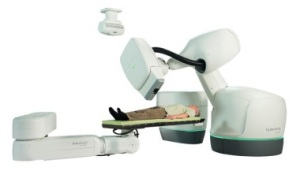by
Gus Iversen, Editor in Chief | March 05, 2015
CyberKnife treatment for a patient with a brain meningioma typically takes about an hour — but using a new collimator, The University of Pittsburgh Medical Center department of neurosurgery has cut treatment time by more than half. The patient was off the table in just under 22 minutes.
The speed of treatment is owing to a multileaf collimator called InCise. DOTmed News spoke to Susan Hopkins, Accuray's global vice president of marketing, about what the faster treatment could mean for patients. She said the very precise nature of CyberKnife stereotactic radiosurgery makes it a slightly longer treatment process than less precise radiosurgical alternatives.
"The time frame is driven by the treatment process," said Hopkins, "A single treatment is made up of many — usually over 100 — non-coplanar beams delivered accurately via real-time image guidance and automatic adjustment of beam aim throughout the procedure."




Ad Statistics
Times Displayed: 19605
Times Visited: 366 Stay up to date with the latest training to fix, troubleshoot, and maintain your critical care devices. GE HealthCare offers multiple training formats to empower teams and expand knowledge, saving you time and money
Reducing the treatment time results in improved patient comfort and improved throughput capabilities for the treating facility, while retaining that same high level of precision. "While dependent on the type of case, we are seeing reductions of around 30 to 40 percent, or more, as reported by UPMC with their first patient treated," said Hopkins.
It will also allow treatment of, "a wider range of tumor types, including larger and different kinds of tumors than were previously treated," said Joshua H. Levine, president and CEO of Accuray, in a statement.
The new collimator, which was initially unveiled at ASTRO 2012 before undergoing additional development, will be available as an upgrade to already installed Model M6 CyberKnife systems.

